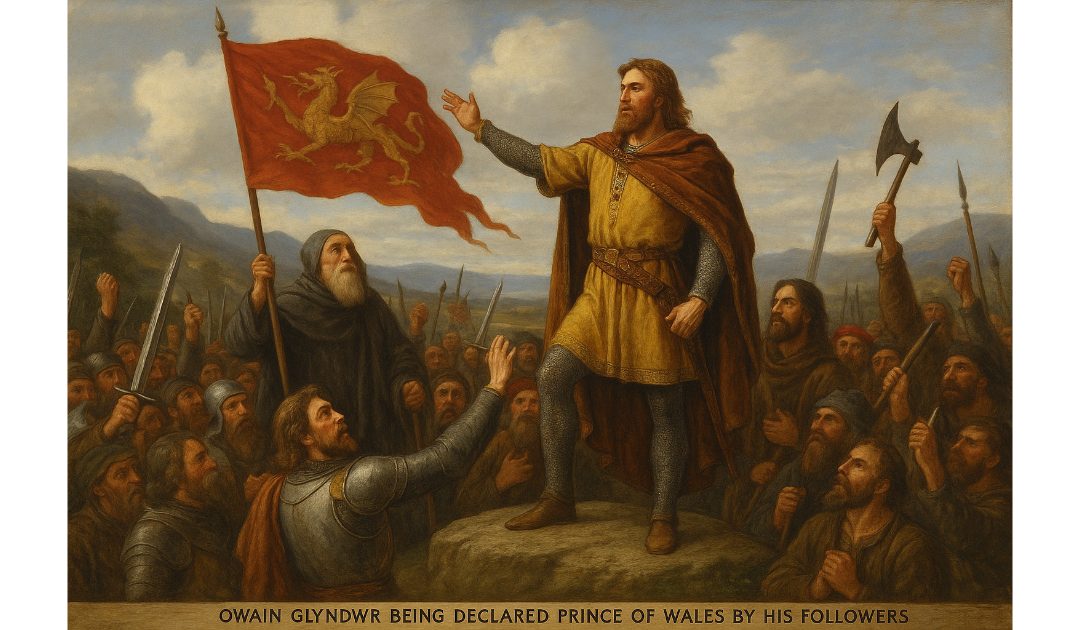On the 16th of September, 1400, Owain Glydŵr was declared Prince of Wales by his followers. I have posted about a later Prince of Wales, Henry Frederick, who gets a mention in my work in progress, The Favourite Murder, the fifth book in the Sir Anthony Standen Adventures.
Owain Glyndŵr, also known as Owain Glyn Dŵr or Owen Glendower in English, remains one of the most iconic figures in Welsh history. Born around 1359 into a noble family in the kingdom of Powys, Glyndŵr’s life was marked by his fierce dedication to Welsh independence, his leadership in revolt against English rule, and his enduring legacy as a symbol of national pride in Wales.
Glyndŵr hailed from a family with deep-rooted connections to both Welsh and Anglo-Norman nobility. His lineage traced back to the Princes of Powys, and through his mother, he was connected to the Princes of Deheubarth. This noble heritage provided him with a privileged upbringing, comprehensive education, and training in martial skills. Glyndŵr was educated in law, possibly at the Inns of Court in London, and served under King Richard II, participating in military campaigns in Scotland and elsewhere.
The seeds of rebellion were sown in the complex political landscape of late 14th-century Wales. The imposition of English laws, disenfranchisement of the Welsh gentry, and constant disputes over land ownership created widespread resentment among the Welsh populace. The tipping point for Glyndŵr came in 1400 when a personal land dispute with his English neighbour, Reginald Grey of Ruthin, escalated. When King Henry IV sided with Grey, it ignited Glyndŵr’s sense of injustice and catalysed his transformation from a local nobleman to the leader of a national uprising.
On the 16th of September 1400, Glyndŵr was declared “Prince of Wales,” a title historically held by native Welsh royalty but claimed by English heirs since the conquest of Wales by Edward I in the late 13th century. This declaration marked the beginning of the Glyndŵr Rebellion, also known as the Welsh Revolt, which lasted until around 1415. The revolt swiftly gained momentum, attracting disaffected Welsh nobles, commoners, and even support from foreign powers such as France and Scotland.
Glyndŵr’s military strategies were both innovative and effective. Utilising guerrilla warfare tactics, his forces achieved significant victories against the English, capturing key strongholds and even burning towns such as Cardiff and Caernarfon. His leadership fostered a sense of unity among the disparate Welsh factions, and for a time, he controlled large swathes of Wales, establishing a de facto independent Welsh state.
One of Glyndŵr’s most notable achievements was the convening of the National Assembly at Machynlleth in 1404, where he was formally crowned Prince of Wales. This assembly outlined his vision for an independent Wales, including the establishment of a Welsh parliament, a separate Welsh Church, and the foundation of Welsh universities. His diplomatic efforts extended beyond Wales, as he sought alliances with France and Scotland, signing treaties that recognised his authority.
However, the tide of fortune began to turn around 1409. The English crown, under King Henry IV and later his son Henry V, mounted relentless military campaigns to suppress the rebellion. The fall of key castles, such as Harlech and Aberystwyth, coupled with dwindling resources and internal divisions among the Welsh, weakened Glyndŵr’s position. Despite these setbacks, he continued to lead sporadic resistance efforts, embodying the spirit of defiance even as the rebellion gradually lost momentum.
Glyndŵr’s final years are shrouded in mystery. Unlike many historical figures, his death and burial remain unrecorded, adding to the legend that surrounds him. Some accounts suggest he lived in hiding, possibly with relatives in Herefordshire, evading capture until his natural death around 1415. His anonymity in death contrasted with the grandeur of his ambitions in life, fuelling folklore and romanticised tales of his enduring presence.
The legacy of Owain Glyndŵr transcends his military campaigns. He is remembered as a visionary leader who articulated a coherent national identity for Wales. His rebellion, though ultimately unsuccessful in securing lasting independence, planted the seeds of Welsh nationalism that would resonate through the centuries. Glyndŵr became a symbol of resistance, his life celebrated in literature, art, and popular culture. Shakespeare immortalised him in the play “Henry IV, Part 1,” portraying him as a mystical and formidable character.
In modern Wales, Glyndŵr’s influence remains palpable. Statues, plaques, and commemorations honour his memory, and his name is synonymous with Welsh pride and autonomy. The day of his rebellion’s declaration, 16 September, is observed by many as Owain Glyndŵr Day, a testament to his enduring significance.

